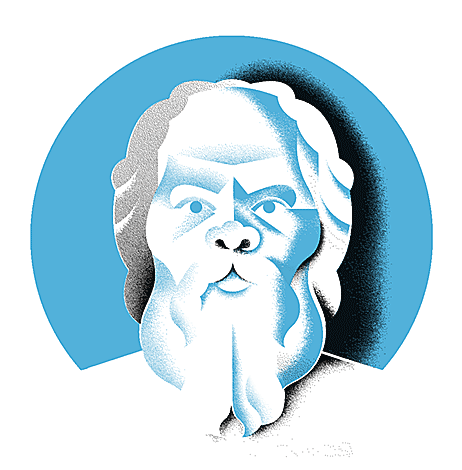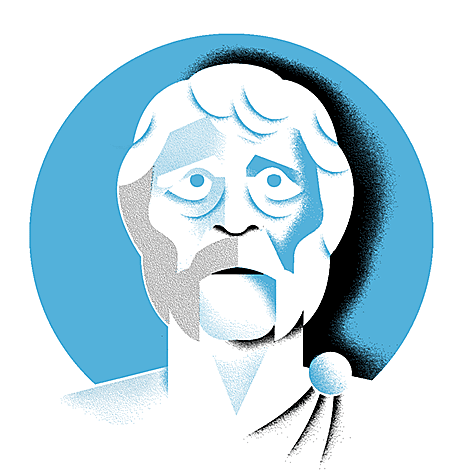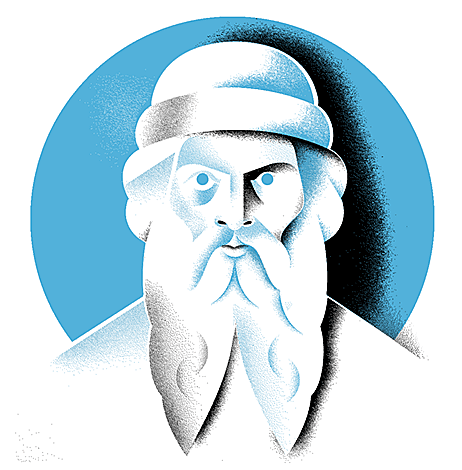Learning from the Best
I click, therefore I am? Quite the opposite: Centuries ago, the great poets and thinkers gave advice on how to use media wisely. How would their tips translate to the today’s world?


E ver heard of digital claustrophobia? No? That's the phobia you can get when you keep having to share (cyber)space with millions of other people who are constantly talking to you, showing you pictures, commenting on your pictures, urging you to like or sign something, asking you for money, or even offering you money... an endless stream of messages rains down on us day and night. Can we escape the information flood without losing contact with our own surroundings and reality? Could we carve out niches for ourselves in overcrowded cyberspace, refuges where we might find some respite?
To answer these questions, William Powers the author of “Hamlet's BlackBerry” - now working at the MIT Media Lab, where he spends much of each day online - looked to some smart minds of the past, including ancient philosophers and prominent thinkers of recent centuries. Here is a look at what he has learned from these “screen philosophers”, in the way of ideas and tips for a better digital life...

Socrates
During the Golden Age of Greece, at about the end of the fifth century B.C., Athens was a great center for artists, poets, philosophers, dramatists and politicians... an intellectual and cultural hub for the entire Mediterranean world. At the time, writing was beginning to supplant oral storytelling in important communication functions, much to the disapproval of the great philosopher Socrates. He thought writing would prevent ideas from flowing freely, and that by freezing them in place, it would rob them of the give-and-take – i.e., the discussion – they needed in order to be able to develop properly. He found written language to be an inflexible medium that could never bring forth new ideas. In sum, Socrates was highly skeptical of writing. His concerns, which we now see as obviously groundless, are relevant for us today in that they can be likened to just about any fear of new media and technological tools, and especially to our anxieties about the new digital media.

Plato
Socrates' student, Plato, was considerably more open to the new medium. He grasped the great potential of written communication: its capacity to overcome distance – separation – in time and space. Orally communicated ideas get forgotten, sooner or later, but written texts live on and can be consulted in their exact original form long after they were produced. Moreover, written words can easily be transported over long distances. Oral messages are more vulnerable in transit and thus much more difficult to disseminate widely. For the new media of today, time and distance are irrelevant. We exploit this fact when, for example, we work at home instead of in the office, or manage our email and make calls on the go. Our ability to work wherever we want – to not be tied to a specific work site – gives us a great deal of freedom. On the other hand, that ability also means we are always in “online mode”, constantly available for everyone. Spatial distance no longer offers us refuge, since the world can follow us anywhere.
Plato – a friend of the new technology of his day – would argue against around-the-clock availability
If he were alive today, Plato – a friend of the new technology of his day – would certainly recognize these two sides of the new communications media, and he would argue against around-the-clock availability. One relevant tip from Plato thus might be as follows: from time to time, take a day off from cyberspace, and go offline. Take a walk (without your smartphone, of course), or talk to the people around you. By putting a little distance between yourself and cyberspace, you will breathe more freely, and your mind will calm down. You'll be surprised at how a short offline period can refresh you!

Seneca
Seneca also thought about “space”, although more in terms of “inner space” than “real space”. A Roman philosopher, teacher and powerful political figure, made Seneca a very busy man. He lived in Rome, the power center of the enormous Roman empire during the first century A.D. Life there was hectic, comparable for its time to life in Berlin or Paris today. Centuries had passed since the time of Socrates, and writing had become a completely established medium, one that allowed the development of the laws and administrative regulations that remain foundations of our social systems to the present day. However, Seneca saw a downside to writing in that messenger-borne texts could follow him anywhere – even to the places he sought out for peace and quiet, away from his work. Today, those unwanted visits from messengers could be likened to that call from your boss, breaking into your Saturday morning sleep to give you an assignment for Monday – and put you back on edge! Or e-mails from a hapless colleague, disrupting your vacation for advice on computer problems.
Seneca would advise you to concentrate on your inner space. Focus on the goals you have set for yourself
Spatial distance is of no benefit when digital media keep us connected and linked with the world. So how can we pry our thoughts away from the endless cyberspace that surrounds us? In our home life, can there be any peace and calm when we check our inbox 20 times an hour, instead of concentrating on what we intended to be doing at the moment – conversing with a good friend, cooking a nice meal or reading a book. Seneca would advise you to concentrate on your inner space. Focus on the goals you have set for yourself, turn away from useless activities, and simply shut off the “digital noise”. But how can we do that? For example, by doingsome writing the old-fashioned way, with pen and paper. It's an exercise that reduces the media to a necessary minimum, allowing our mind to concentrate on a single activity, namely writing. Other useful activities are those that involve working with our hands such as cooking, knitting or building something. We can also simply have a good conversation with a friend in a café – but make sure your phone is off!

Gutenberg
When a new iPhone comes out, people line up for days in front of the stores, in the belief that new communications devices make them happy! They are new and shiny. They have all kinds of cool features unavailable to those who are still using old phones. Just as important, we want to join the great conversation happening around us, stay current, keep up with the times. New communications media have always been outwardly oriented, and this serves an important purpose. We are social animals, and networking with others is good for social and professional survival. Even reading was once a highly extroverted activity, since for centuries books were so expensive that few people could afford them. Thus texts were typically read aloud to large groups. Gutenberg's invention of the movable-type printing press, around the year 1450 suddenly made book production much faster and cheaper, meaning that books themselves suddenly became far more accessible. As more people were able to afford books, many discovered that reading itself could be a space apart, a sort of refuge from the world, where one could find focus and inner calm.
New technologies can actually help us find a way into our inner zones of peace, if we use them correctly
Today, printed books seem rather anachronistic and even obsolete by comparison to our e-books. E-books offer so many advantages: they are lighter than regular books, can be read in the dark, take up no shelf space, employ no paper from cut trees... All of which is well and good, but Gutenberg might note that because an e-book is linked with the digital world, it can block our access to that inner refuge. Interactive options such as instant translators, commentary functions and other features keep us in contact with cyberspace and turn our attention outwardly instead of inwardly. When we look at other modern communications media, often the devices we like best are those that give us the opportunity to be quiet and inward again — people walking along listening privately to podcasts, or watching films on their laps without advertising breaks and other interruptions are doing exactly that. In other words, new technologies can actually help us find a way into our inner zones of peace, if we use them correctly.

Shakespeare
Do you have a paper notebook? If so, have you ever asked yourself what is so special about this vintage medium, an “analog device” that, in this fast-paced modern world, one would expect to be obsolete? As it happens, Shakespeare can help us understand our mysterious fascination with old-school notebooks. The great Bard lived in London, in the late 16th century. At that time, the city was extremely overcrowded, loud and dirty,and the political situation was unstable following King Henry VIII's break with the Catholic Church. Book printing had led to an enormous spread of written material – and, thus, of information. London was full of advertising, pamphlets, sale contracts, notices, and also a very new invention: newspapers. Some people were overwhelmed by all this information swirling around them; they felt powerless to hold back the flood of ever-new messages.
Shakespeare would urgently advise you to get a diary or a notebook, something with which to keep track of, filter and then discard each day's new flood of information and ideas.
Shakespeare's answer was the “table-book”. An invention that first showed up toward the end of the 15th century in Europe. In “Hamlet's BlackBerry”, Powers describes it as a pocket-sized almanac or calendar with blank pages made of specially coated paper or parchment. The writer used a metal stylus and later erased notes with a sponge so that the pages could be used again. In other words, this invention amounted to a notebook with erasable pages! We don’t know for certain that Shakespeare owned a table book, but it’s likely he did. Busy Londoners like him carried such a table-book around them all day. They used to write down thoughts, reminders, appointments, shopping lists... simply everything! In Shakespeare's case, in the evening we can imagine him going through all of his jottings and transferring the most important notes into his permanent notebooks. He would delete unimportant information. And that is exactly the advantage of paper notebooks today: during the day, we can use them as “sponges” for capturing all of the impressions and information that rain down on us. Later, we can go through our notes, remember the relevant parts, and transfer the important information into our digital media, for saving. All unimportant information is deleted. What is more, a notebook helps us focus our attention, it doesn't send or receive any electronic information, doesn't blink or buzz and is not connected. Odds are that Shakespeare would urgently advise you to get a diary or a notebook, something with which to keep track of, filter and then discard each day's new flood of information and ideas. The world will seem to slow down for you, and you'll find your spirit will calm down.

Benjamin Franklin
Most of us have heard of casual Friday – that last day of the working week when employees at many companies are allowed (and even encouraged) to wear casual clothes to the office, in order to help create a more relaxing work atmosphere. But have you ever heard of “email-free Friday”? No? Probably you've never heard of it because it has not really been accepted - not yet. It's a project that was started by a few companies in the U.S., in order to shield employees, on at least one day of the week, from constant streams of incoming mail and to enable them to concentrate on other tasks. However, email-free Fridays never really caught on. Why is that? After all, we all complain constantly about our full inboxes. Why shouldn't we be happy about a day without any email? Benjamin Franklin has an answer for this: because we are not ourselves convinced of the usefulness of such a change, and because the initiative comes top-down – from bosses.
Franklin was seeking to identify unproductive habits that burdened him and replace them with positive new rituals.
Franklin was an extremely busy person. As a journalist, he was given the nickname “busy boy”. He was a very social person - an avid social networker - and his love life was a succession of often wild affairs. He lived completely “out in the open”, and he recognized how important it was for individuals to interact socially. But he also understood that permanent connectedness, with our attention fragmented over countless activities, exacts a high price and can cause us to lose sight of our goals. To address this problem, he created a regimen for himself that would help him to lead a “reasonable” life. That meant a life in which he would find more long-term pleasure and satisfaction by resisting impulsive desires. While that might sound dry and even prudish, basically Franklin was seeking to identify unproductive habits that burdened him and replace them with positive new rituals. We could translate this approach as follows, for our own purposes: if 24/7 email is really getting to us, then we should do something about it. Perhaps we could develop a ritual of consciously not checking our mail as soon as we wake up, and of waiting instead until we get to the office. If we normally spend the entire day in front of a screen, we could also consciously take the time to do something pleasant and enjoyable in the offline world, such as taking a walk, going to the movies, cooking with someone, or ... Take the time to ponder this, and be honest with yourself. You are sure to find good ideas for changing your bad habits.